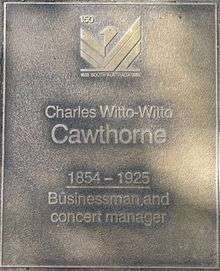Charles Cawthorne
Charles Witto-witto Cawthorne (1 July 1854 – 26 June 1925) was a businessman who, with his father founded Cawthorne and Co, music publishers and retailers in Adelaide, South Australia. He was a proficient musician and important in the history of orchestral music of Adelaide.

History
Charles Cawthorne was born in Adelaide the second son of W. A. Cawthorne and educated by his parents – his father was a noted schoolmaster[1] and his mother a talented pianist.[2] He studied violin under F. Draeger and piano under Gustav Louis Esselbach (died 2 June 1885) and as an adult, music was his great interest, both as a performer and as a promoter and organiser. He was co-founder with his father of Cawthorne & Co. as a business involved in every aspect of music-making, and chairman of directors of Cawthorne's Limited, a family company formed to take over the business.
He was also active in non-professional organisations such as the Adelaide Choral Society, Elder Conservatorium students' concerts, the South Australian State Orchestra, and Minda Home. At the age of 18 he was made conductor of the Adelaide Amateur Orchestra. He and W. C. Chapman formed the nucleus of orchestras for major social events at Government House and the Town Hall, and founded the Adelaide Orchestra, which became (Hermann) Heinicke's Grand Orchestra. He founded the Conservatorium Grand Orchestra which became the Adelaide Grand Orchestra. In 1910 he founded the Adelaide Orchestral Society. In each of these he played bassoon, and occasionally conducted.[3] He also had some success as a composer of waltzes.
He did much to promote local talent – he was prominent in raising funds to enable violinist W. L. Harris,[4] pianist John Bishop[5] and singer Helene Taylor[6] to study overseas. During the Great War he was prominent in patriotic fund-raising activities: during 1915 he organised no fewer than 60 concerts featuring such musicians as the Adelaide Bach Society, Adelaide Choral Society, Adelaide Orpheus Society and soloists Delmar Hall, Brewster Jones, and Thomas Grigg.[7]
He organised concerts starring the great soloists of the day – Madame Albani, Amy Castles, Peter Dawson, Clara Serena, and Hilda Felstead.[8]
Three of his four sons, Gus (1887–1937), Cyril (1894–1971) and Frank (1899–1985), had a continuing involvement with the company. See main article for family details.
Recognition
He has been recognised by:
- a plaque on the Jubilee 150 Walkway
- A newspaper nominated him one of the 15 notable SA musicians of the late 19th and early 20th century: Frederick Bevan, Charles Cawthorne, E. Harold Davies, J. M. Dunn, Thomas Grigg, Hermann Heinicke, John Horner, E. H. Wallace Packer, Harold S. Parsons, W. R. Pybus, I. G. Reimann, William Silver, C. J. Stevens, Oscar Taeuber, Arthur Williamson[9]
See also
References
- W. A. Cawthorne had a serious interest in aboriginal culture, and several, perhaps all, of his children were given Kaurna middle names.
- "A Lifetime in Music". The Advertiser. 17 November 1916. p. 9. Retrieved 26 January 2015 – via Trove.
- Edgar, Suzanne; Gibberd, Joyce (1979). "Cawthorne, Charles Wittowitto (1854–1925)". Australian Dictionary of Biography. Melbourne University Press. ISSN 1833-7538. Retrieved 26 January 2015 – via National Centre of Biography, Australian National University.
- "Mr. W. L. Harris's Concert". The Register. 2 July 1900. p. 3. Retrieved 26 January 2015 – via Trove.
- "John Bishop". The Register. 9 June 1923. p. 12. Retrieved 26 January 2015 – via Trove.
- "Helene Taylor". The Register. 31 August 1922. p. 8. Retrieved 26 January 2015 – via Trove.
- "Cawthorne Activities". The Mail. 8 January 1916. p. 3. Retrieved 7 February 2017 – via Trove.
- "Obituary". The Chronicle. 4 July 1925. p. 59. Retrieved 24 January 2015 – via Trove.
- "Notable Adelaide Musicians: Past and Present". The Chronicle. 7 September 1933. p. 31. Retrieved 8 February 2017 – via Trove.
External links
- http://nla.gov.au/nla.news-article73605177 – Obituary, Advertiser, 27 June 1925
- http://trove.nla.gov.au/people/679081?q=Charles++Cross&c=people
- https://web.archive.org/web/20150215160929/https://histfam.familysearch.org//getperson.php?personID=I115898&tree=SouthAustralia – Family tree
- https://web.archive.org/web/20120321115410/http://music.slsa.sa.gov.au/zsmi14665633_s001_fc.htm – Olivia [music] : waltz / composed by Chas. Cawthorne
- https://web.archive.org/web/20120420223701/http://www.samemory.sa.gov.au/site/page.cfm?c=2675 Olivia
- https://web.archive.org/web/20120402090443/http://www.samemory.sa.gov.au/site/page.cfm?c=523 The wireless telephone
- Google books – 1
- Google books – 2
- http://www.uhr.gravesecrets.net/c.html%5B%5D – Cyril Cawthorne (1892–1971)
- https://web.archive.org/web/20130419204335/http://www.graemeskinner.id.au/biographicalregisterC-D.htm – CAWTHORNE, Charles Violinist, conductor, composer, music retailer, memorialist
- http://digital.library.adelaide.edu.au/dspace/bitstream/2440/64930/1/312-55.jpg – Notable Adelaide Musicians